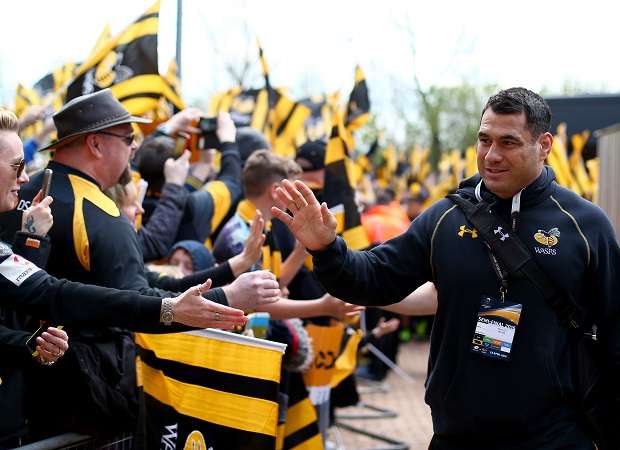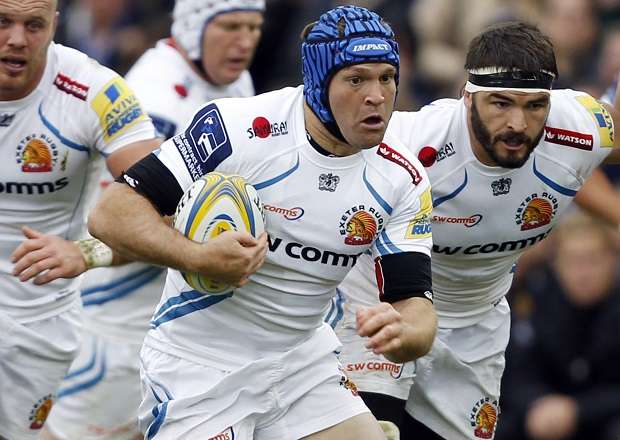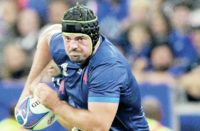 George Smith has always defied convention, and the 35-year-old veteran Aussie openside continues to do so, capping his first – and most likely last – season in the Premiership with Wasps by winning the RPA's Players' Player of the Year Award for 2016. The accolade, which was presented to Smith at the RPA dinner in Battersea on Wednesday night, was not the first gong of this magnitude he has won, having been crowned Australian Super 14 Player of the Year four times in a row between 2006 and 2009.
George Smith has always defied convention, and the 35-year-old veteran Aussie openside continues to do so, capping his first – and most likely last – season in the Premiership with Wasps by winning the RPA's Players' Player of the Year Award for 2016. The accolade, which was presented to Smith at the RPA dinner in Battersea on Wednesday night, was not the first gong of this magnitude he has won, having been crowned Australian Super 14 Player of the Year four times in a row between 2006 and 2009.
At the time the Wallaby No.7 was also on his way to outpacing his New Zealand rival, Richie McCaw, to the distinction of becoming the first player to reach 100 Test caps, which he did aged 29.
This season the remarkable Smith has brought vivid colour to the Premiership and the European Cup with his array of skills undimmed despite making the last of his 111 Test appearances for Australia against the 2013 Lions. His gifted, inventive handling and linking have made Wasps the most sparkling attacking side in those tournaments, with his brilliant reefing of the ball at breakdowns to win turn-overs from contorted angles.
Forget England's ‘wannabe' No.7 whippersnappers, because good as Teimana Harrison, Matt Kvesic and Jack Clifford have been, it has been Smith's portrait of the artist as an old man which sticks in the memory. He has played for Wasps with a zest which defies his years, and speaks volumes for an insatiable appetite for improvement which has seen him blast aside the age barriers.
It is these qualities that make Smith such an authoritative assessor when it comes to considering where the Premiership clubs, and an England side coached by his old Brumbies and Wallaby mentor, Eddie Jones, are in the global pecking order. And in terms of rugby travels, Smith, with his experience of playing for Toulon and Lyon in France's Top 14 before joining Wasps, and his time with Suntory in Japan, as well as his grounding in Super Rugby, is as worldly as they come.
Smith's manner is understated and considered, but the global rugby guerrilla is unmistakably chuffed with the award, making a fleeting visit to the RPA bash to claim it despite the demands of early morning training, with Wasps in the throes of preparation for Saturday's season-defining Premiership semi-final play-off against Exeter.
“I only turned up to receive the award, so I wasn't there for the entirety of the evening because we had training this morning. It was kind of them to allow me to do that. I've a rubber arm (easily persuaded), so I'm not sure if I'd been there for three hours I would have been able to talk!”
After 17 outings for Wasps this season he adds: “With these awards that are voted by your peers, they are more critical of your performance. When you play against other players you want to see what attributes they bring to the game, so in some ways the critique is more severe. To have that respect and recognition from fellow players in the RPA is very humbling – and at the same time it's a recognition of the way that Wasps play the game.”
He reflects, too, on the pressing business of travelling to Exeter's Sandy Park stronghold for the second time in a fortnight, with success or heartbreak the only outcome. With Wasps two-one down in their ledger against the Chiefs this season, having beaten them in a European Cup quarter-final classic but been heavily beaten twice in the league, Smith says it will take a special performance if their Premiership title bid is to stay alive.
“It's going to be hugely difficult. We have history with Exeter this season, but both teams play a similar very exciting brand of rugby. We like to throw the ball around and we have the ability to hold possession for numerous phases, and both teams have a good attacking structure and tend to score tries. It's a huge task. Although that was my first experience of Sandy Park a couple of weeks ago, the crowd were very vocal, and that's a factor in any game.”
He continues: “A semi-final is a different beast, and when you get one you don't want to leave anything out there, or take anything for granted. The previous games against them do impact on your analysis, and it's an advantage having three games in which to see their trends. But in terms of a semi-final it's a one-off, a do-or-die situation.”
However, he acknowledges that Exeter are formidable up front, and pile on the pressure with their offensive defence. So, what have Wasps got to do to break their grip?
“Pressure on key players definitely helps. They have a very entertaining back three who seem to pick the right moments to attack. Jack Nowell is a fantastic attacking weapon, and (Henry) Slade is very comfortable in games. Their back-row works very hard, and all three have very good engines.
“I've a huge respect for Julian Salvi who I've known since he first came into professional rugby at the Brumbies, and I really enjoy playing against a person who has come to the UK and made a name for himself here.”
Smith says it has been part of a Premiership experience that he never expected, and which has been the opposite of the conservative stodge he anticipated.
“I never envisaged myself playing in the Premiership due to the weather, and a style of play that I thought was stereotypical to the climate. But having been here I've found that it's the complete reverse. The way you play is dictated by the team, and the top players within it, and at Wasps we have exciting backs and forwards who want to run the ball and pass it around.”
Smith has been impressed that there are teams with similar attitudes, but that there are also different styles among the clubs, with some being more structured. He says he enjoys the variety.
“I guess with the foreign teams I've played for having different cultures and personalities it's a nice change, as are the different styles of play. With the Brumbies we were predominantly an Australian team – I think during my time there were only three foreigners in the squad – so there are many more variables in Europe because of the number of different ways people grew up playing rugby in most teams.”
However, he says that the workload on Premiership players is daunting. “The demand on players is huge – particularly after a World Cup – and with no LV= Cup, which traditionally would give first-team players a bit of a rest, that's been quite challenging. But at the same time it shows the player depth that is needed within this competition.”
Smith has described Wasps as determined and driven, which sounds very much like his own mirror image. Suggest this and the response is that of a restless and relentless perfectionist.
“Within the group every player has to be determined and driven – if you're not improving then it's not fair on the players next to you. Striving to be better is an advantage to the players around you, and it's infectious. That's a drive of mine.
I want to improve, and while in some aspects I'm not as dominant as in previous seasons, I think in others I've improved immensely, like my awareness of other players and in reading different situations.
“My experience has definitely shown this season because I'm much more mature in the way I play the game.”
Smith reveals that, with a return to Japanese club rugby imminent, he has no intention of hanging up his boots, although he says skills coaching could be an option down the line.
“In terms of the next stage I'm going to continue playing rugby because I feel that I have the ability to compete at a first-class level. In terms of coaching I definitely see myself as a mentor in terms of passing on my experience in helping junior players to improve their skills. I don't know about managing 40 different personalities, but specific coaching might be an avenue I'd explore.”
Smith gives a qualified ‘yes' when asked if he thinks Wasps will achieve sustained success after his departure.
“I hope so. But there's going to be a high rotation of players next season due to the number of players leaving. With recruitment it's a huge undertaking for the coaching staff to keep the mentality of accountability in upholding the way Wasps play.”
The subject of maintaining new-found success inevitably raises the question of what Smith thinks of England's chances on tour in Australia this summer, and also going forward under Eddie Jones to the 2019 World Cup.
His endorsement of Jones, who brought him into the England camp as a breakdown consultant during the Six Nations, is staunch: “Under Eddie's leadership the team are in safe hands. I can only judge on what's happened so far with the early success in the Grand Slam, and also from the feedback from the players that they enjoy the environment. Players are very relaxed in being able to approach Eddie and the coaching staff. That's always a good start, and working with Eddie in the past I know that his attention to detail in game-play and preparation is second to none.”
Yet, he adds a warning. “Confidence within the English team will be pretty high going Down Under after a Grand Slam win, but playing an Australian team on home soil is a different prospect. They will be a formidable opponent, and they always seem to perform well in those mid-season Tests.”
Smith identifies the faster pace of the game in Super rugby as giving the Wallabies a potential advantage in the three- Test series, although he likes the greater contest for possession in Europe.
“In the last few weeks the pace of the game here has picked up with the drier surfaces. There are fewer knock-ons, and with quicker ruck speed more players are inclined to run the ball rather than kick. Throughout the Super Rugby season there is an automatic switch to run the ball when you receive it, whether from kicks, exit plays or your starter plays off set piece. Their initial reaction is to run.”
He adds: “Super Rugby is a lot quicker, and you can see that from the TV coverage. However, at the breakdowns in Super Rugby the players are very ‘nice' in allowing it to be so quick. It's contested a bit more up here…”
Yet, it is the constructive role of the No.7 that Smith prizes most, and he says that he's noticed the gains made by Premiership opponents like Kvesic, Harrison and Clifford.
“All I can speak of is what I've experienced this year, and the skill set of the players I've played against has improved from what I guess it was in the past. The mentality these days is to play, and the crowds expect you to entertain them rather than play a parasitic style of kick and chase and rely on an opposition mistake.”
However, he says that the undoubted leaders in the creative stakes are the dynamic Wallaby duo of David Pocock and Michael Hooper, who wreaked havoc against England during their disastrous World Cup.
“What I like about Pocock and Hooper is their link play – their ability to add a different dimension to the way they play. They are not just specific fetchers and destructors at the breakdown, they also have the ability to throw that subtle pass and draw in defences to allow the backs to cause some disruption out wide.
“It is an underestimated skill set, and a hugely important part of junior development to encourage ball skills and the ability to read opportunities. That's one of the main things that sets them apart, because all players from one to eight in the pack can jackal the ball and contest it at the breakdown.”
Ask Smith if there was anything that surprised him when he was called-up by Jones to do his coaching session with England, and he reveals that the players who were participating in the drills
volunteered to train with him on their day off. “That was a selfless thing, and showed an attitude that they want to improve – and to pick my brain on body mechanics (at the breakdown) – and listen, and be a sponge.”
They couldn't have found a better tutor, or a more deserving Players' Player prize-winner. George Smith's time in the Premiership may have been relatively brief, but he remains one of the great No.7s and his legacy has powerful legs.


























